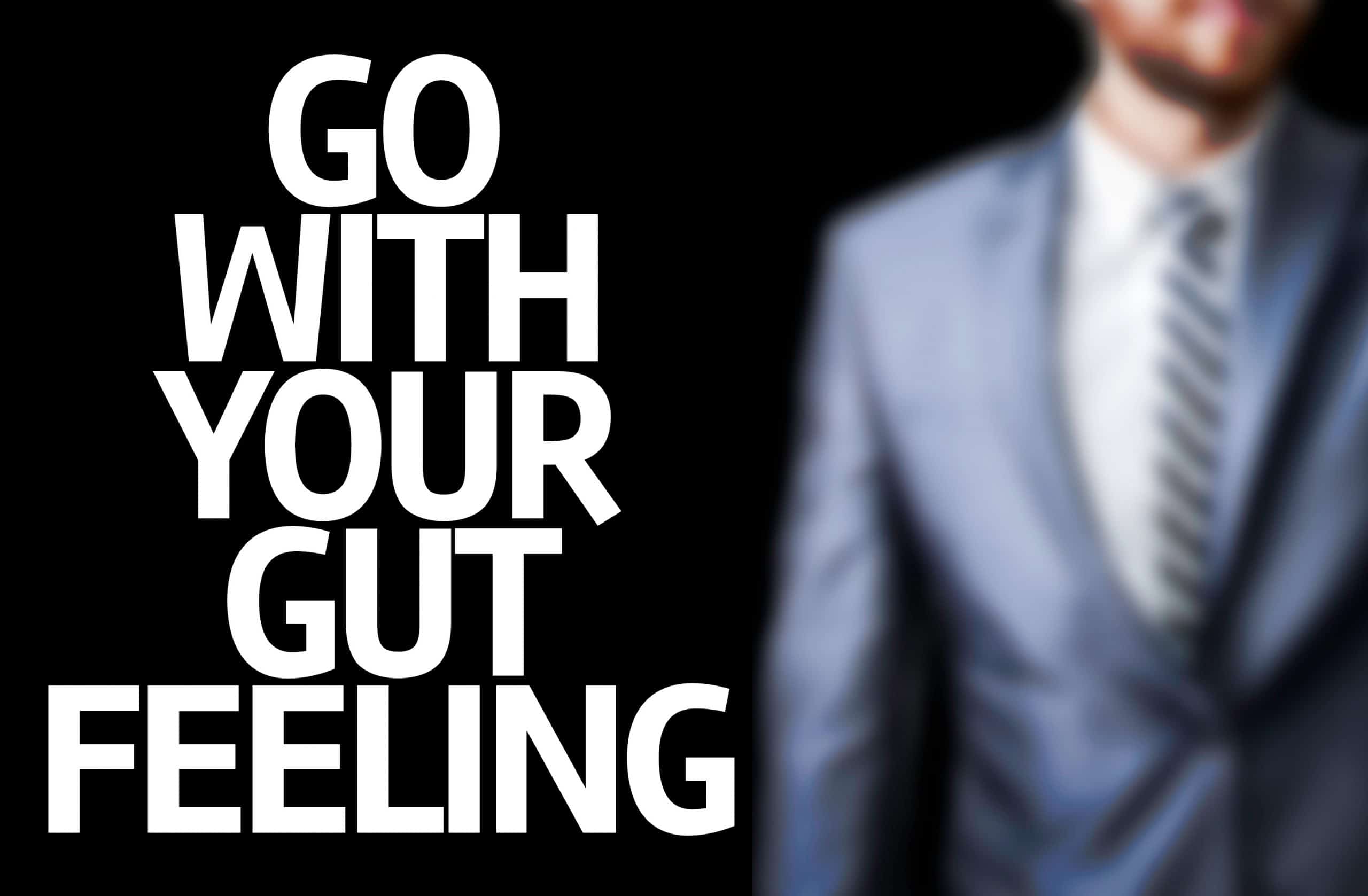
Trust your gut, they say. Gut instinct is one of the coolest things we have as humans. Call it intuition, or whatever you want, but we all know that feeling when you don’t have to think about something at all; you just know.
Often, following our gut instinct can be to your advantage. This can be regarding a person, place, job, opportunity, and the list goes on. Sometimes gut instinct can be a flutter in your stomach, a sudden change of temperature, or just a feeling deep inside that you can’t quite put your finger on.
Sometimes, gut instinct gets called “women’s intuition,” usually by women, but this is generally because some people believe women are more in tune with their feelings and emotions than men. Not to say that women have any more instinct than men, but men are more likely to ignore the feeling.
Many men don’t like to think that they should rely on their feelings when making big decisions, so they are much more likely to use the term “trust your gut” or “having a hunch.” This helps them maintain their confidence and self-esteem.
Gut, instinct, intuition, hunch, sixth sense—whatever you want to call it, we all have it. It is a tool that should be used more often for our advantage if only more people would be in tune with themselves and learn to trust it.
What Is Intuition?
Intuition is the ability to immediately understand something, for no reason. It is a thing that you know or consider to be likely based on an instinctive feeling rather than conscious reasoning. It is derived from the Latin term “intueri,” meaning “to gaze at, contemplate.”
To act on your intuition implies that you’re opening your mind to your internal thoughts and feelings, balancing those against the facts obtained by your senses.
Remembering Your Experiences
Your brain is packed full of information, endless supplies of knowledge that it has obtained over your entire life. Not just what you’ve read about in books, but an ever-growing accumulation of everything you have ever come across over the years.
The entirety of all you have ever learned in your life is what factors into how you make decisions, whether consciously or not. The more experience you have, the better instinct you will have.
Based on exactly what your experiences have been, some people might have corrupted instincts. For example, those raised in abusive households or who have experienced trauma often have difficulty differentiating between their instinct and trauma response.
Using Your Experience
Intuition can largely be based on your emotional intelligence. Often, your mind and body will make a judgment for you without you even having to think about it at all, based on what’s going on around you.
For example, let’s say you feel an emotional connection with someone after just meeting them. Whether it is a platonic friend or someone you would like to date. It doesn’t have to be because of anything they’ve done, just a feeling you get about that person. Perhaps it’s a negative emotion—maybe you just feel like they’re no good, shady, or suspicious. Your instinct uses your prior experiences to assess the scenario, and sometimes you may not even realize it.
Have you ever brought an umbrella to work even if it was not going to rain, and then it did? Or maybe left an area full of people just before a fight broke out? Perhaps you’re one of those people who always guesses the end of the movie, or who the bad guy is long before it’s revealed.
Do you often judge people based on your first couple of interactions, and later learn that you were dead on? You probably couldn’t explain how you knew those things, even if you were asked. It’s just a feeling. It’s your gut instinct.
Your brain subconsciously uses your previous experiences to make a call in the moment after correctly analyzing a person or situation.
Intuition, Instinct, or Coincidence?
Intuitive consultant Sonia Choquette tells us, “When you follow your gut instincts you are putting something very natural to work. Your intuition will take you beyond the threshold to a place that reflects your most passionate interests and nature. By using intellect only, and not your innate wisdom, you are keeping yourself from the most powerful insights.”
Many famous names we know today have used their intuition despite all odds and have had it turn out in their favor. Henry Ford, in 1914, was thought to be crazy when his solution to turnover was to start paying his employees double what they were making. But a year later, turnover was down tremendously, and productivity was better than ever.
Mark Zuckerburg’s gut apparently told him that students would be very interested in a platform that kept them connected on campus. Was it a coincidence?
Perhaps not to so many extremes, as not all of us can afford to take such huge risks on “just a feeling,” but we’ve all felt that before. More often than not, especially when it comes to people, you should learn to trust your gut instinct whenever you can. It’s often more accurate than your conscious assessment.
Exercising Your Instincts
Like most skills, without practice your instinct and intuition can grow dull if not used regularly. If you truly want to hone in on your gut instinct, it must be practiced regularly, and you must be prepared for a few hiccups along the way. Here are some of the best ways to develop your intuition and instinctive skills.
Trust In Yourself
This is an extremely important step, not only in exercising your instincts but also as a life rule in general. Being confident in your ability to make decisions based on what you believe to be correct will get you far in life.
Being able to go after what you want, and having the attitude that you will succeed, frequently leads to the best success. Mind over matter is truly a beautiful thing.
Of course, you will make mistakes along the way. The key is to not let that dissuade you from trusting your gut in the future. Practice makes perfect, and you are bound to get a few wrong before you begin to find your groove and hone your instinct to perfection.
It’s imperative to know the difference between your gut instincts and your logical mind—acting on impulse based on the first reaction you get is how to exercise your instinct. Do not take the time to walk yourself through the possible scenarios and talk yourself out of making an instinctive decision. Instead, trust that you will be right.
Stay Focused
Your instinct comes from all of your past and present experiences. Whether your conscious mind knows it or not, you are constantly taking in information that will help you make intuitive decisions.
Avoid becoming distracted, being on your phone, iPod, mp3 player, or anything else that hinders you from being completely aware of your surroundings. This can be anytime—walking, driving, or just sitting on a park bench.
The more you watch people and take in data, the more information your brain will have and be quicker to make those snap instinctive decisions for you in the future.
Write It Down
When you start to notice you have an intuitive feeling, keep a record to see how often you end up being right. Writing it down, or typing it on your phone, can be very effective in understanding your intuitive abilities and whether you should truly be trusting your gut or not.
Sometimes you may be having an instinctive feeling and not even know it. It can be something as small as a slight flutter in your stomach, your heart skipping a beat, or the hairs on your neck and arms standing up straight.
Keeping track of these physical reactions and whatever outcome that comes after will allow you to determine how accurate your natural instincts are. This can greatly boost your confidence levels as you see when you are right and when you’re not. When your instincts prove to be wrong, this allows you to look back and evaluate why you reacted the way you did and how to recognize it next time.
Be Mindful
There are many different ways that people learn to become mindful—meditation, prayer, yoga, and many others. Many people think it doesn’t help, but they would be wrong. It’s true that you do actually have to become disciplined in quieting your mind, and taking the time to put in the work, but it is worth it in the end.
To start, take just 10-15 minutes out of your day and find a peaceful, quiet area to let your mind wander. Try to keep your mind peaceful and your demeanor calm, and don’t allow rational or stressful thoughts to interfere.
If you find yourself constantly going back to the same thoughts, such as a relationship, a job, or something else that is making a large impact on your life, you should take that as your instincts telling you to put more effort into that situation. Make more time for your significant other, try harder, and do your best at your job.
There are many ways to trust your gut instinct and use it for your benefit. Don’t be reckless and assume you will be right all the time without any proof. Take the time to know yourself, practice your skills and be sure to keep yourself in the proper headspace—you will be amazed by the results.











